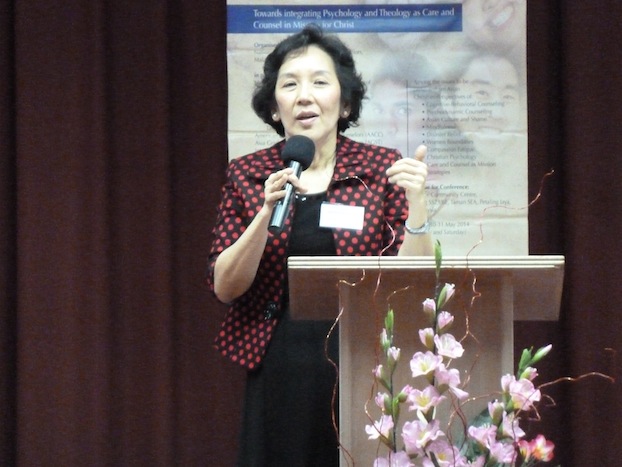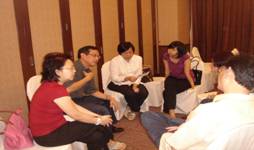
3 June 2014 by Adeline Lum CM-
Dr Rosa Ching Shao—clinical psychologist serving as a Field Education Director of Biblical Seminary of the Philippines—shared in the first Christian Counseling Conference in Asia (organized by NACC) on the 31st May at the Grace Community Centre.
She shared about the topic ‘Emotion, Key to Understanding One’s Self.’

“Emotions are actually designed by God. These emotions do not take place in a vacuum. In fact, they are experienced in a personal relationship with someone between two people or groups of people,” said Dr Rosa.
The Bible says how God saw everything that he had made, and it was very good. (Gen 1:31) And that includes the emotional aspect of Adam and Eve as well, which mirrors the emotional aspect of God. We can see how relational God is when He blessed Adam and Eve with an emotional charge to be fruitful and multiply, and rule over every fish, bird, and living thing that moves on earth. (Gen 1:28) Amongst God’s creations, mankind shares the closest communicative bond with God.
Before the fall, the attachment between God and men, and between Adam and Eve, was strong, secure, and complete. Internal needs to love, to be loved, and to find in Adam and Eve were met, manifesting outwardly as a perfect and harmonious life as ‘one flesh’ in God. (Gen 2:24)

But after the fall, sin disrupted the relationship between God and men, and between Adam and Eve. This distortion of relationships causes anxiety, anger, depression, and guilt, which manifest outwardly as jealousy, coveting, stealing, lying, and adultery, to name a few examples.
Dr Rosa shared that Jesus Christ experienced a whole range of emotions as well. He experienced the full joy through the Holy Spirit (Luke 10:21) and he was glad to show his disciples of the resurrection of Lazarus by God. (John 11:14) Yet, Hebrews 4:15 also tell us that Jesus is able to sympathize with our weaknesses. Jesus wailed while he offered prayers and supplications to God before the crucifixion. (Heb 5:7) And we know Jesus as a man of sorrows who is acquainted with grief. (Isa 53:3)
While some of us may think that Jesus is ‘too holy’ to feel anything, Dr Rosa quoted Narramore in the book ‘The True-self Life of Jesus’ that: “Jesus experienced a wide range of emotions, which many people, including some Christians, consider negative, wrong, or sinful. Jesus’ emotional life was flexible and varied, rather than fixed and varied. Jesus was aware of (and in touch with) his own emotions.” (1)

In other words, emotions are created by God under his Good Will. According to Paul Ekman, there are six universal emotions in this world including happiness, surprise, sadness, fear, disgust, and anger. But in the 1990’s, the emotions are expanded to include amusement, contempt, contentment, embarrassment, excitement, guilt, pride in achievement, relief, satisfaction, sensory pleasure, and shame.
Quoting Daniel Goleman, Dr Rosa shared the following factors to determine a successful emotional quotient, known as EQ:
- Knowing your emotions
- Managing your own emotions
- Motivating yourself
- Recognizing and understanding other people’s emotions
- Managing relationship, i.e. managing the emotions of other’s
She shared that each of us has our unique ‘emotional fingerprint’ according to the 6-dimensions Emotional Styles developed by Richard J. Davidson. By knowing our ‘emotional fingerprint’ well, we are able to master our emotions better, and learn to be more fruitful in life.

Lastly, what’s most exciting in Dr Rosa’s presentation is perhaps the revolution in neuroplasticity, which show that ‘our brain can be changed as a result of our daily life experiences—how we behave and what sensory signals arrive in our cortex, such that activity in specific circuits can increase or decrease.’ (2)
This discovery explains to us why the Bible ask us to not only meditate the Word of God (i.e. sensory signal of God’s Word arriving in our cortex), but also to live out the Word (i.e. behave according to the Word) because only by doing both, we can truly and gradually transform our mind with the mind of Jesus Christ. Romans 12:2 (NLT) put it nicely: “Don’t copy the behavior and customs of this world, but let God transform you into a new person by changing the way you think. Then you will learn to know God’s will for you, which is good and pleasing and perfect.”

She also shared on a worthy note that studies show: “All information-processing is emotional, in that emotion is the energy that drives, organizes, amplifies and attenuates cognitive activity, and in turn is the experience and expression of this activity.” (3)
Indeed, how well we master our emotions indicate whether our emotion amplifies or diminishes our cognitive activity. In other words, the better we master our emotion (to drive and not hinder our cognitive activity), the more fruitful we are in life. The Bible says these wise words: “I have the right to do anything”–but I will not be mastered by anything.” (1 Cor 6:12 NIV)
Also, there are no negative and positive emotions in the biblical context (according to the range of emotions introduced by Paul Ekman). But whether an emotion is positive or negative, that depends on the fruit of our emotions based on the foundation of Jesus Christ. For example, although sadness is an unpleasant emotion, this emotion is fruitful if it leads us repenting of our sins. However, if sadness drives a person to commit suicide, then that would certainly be unfruitful and a sin.
In conclusion, like it or not, emotion are part of who we are. Hence, observe, know, and learn to master your emotions for a fruitful life in Christ. Also, transform your mind not only through meditating the Word of God, but also living it out in our behaviors.
References:
(1) Kirwan, Chapter 8: The True-self Life of Jesus, 5-6
(2) Edmund Ng, Culturally-sensitive Christian Counseling in Asia (Malaysia: NACC, 2014, 51)
(3) Daniel J. Siegel, The Development Mind: Toward a Neurobiology of Interpersonal Experience (New York: Guilford, 1999, 123)
Note: Rosa Ching Shao, PhD, is a clinical psychologist serving as Field Education Director of Biblical Seminary of the Philippines and Professor in AGST-Christian Counseling, Philippines, She has authored a number of books and also co-authored with her husband the ATA Commentaries on Ezra, Nehemiah, Joel, and other’s.





Leave a Reply